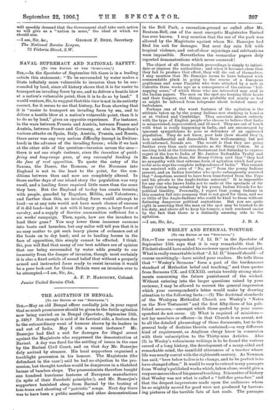• THE AGITATION IN BENGAL.
[TO THE EDITOR OF THE " SPECTATOR:1
Sin.,—May an old Bengal officer cordially join in your regret that so much prominence should be given to the futile agitation now being carried on in Bengal (Spectator, September 15th, p. 349) ? Not enough is said of its farcical side, a feature due to the extraordinary want of humour shown by its leaders in and out of India. May I cite a recent instance ? Mr. Banerjee had filed a suit for damages for illegal arrest against the Magistrate who suppressed the demonstration at Barisal. A day was fixed for the settling of issues in the case by the Barisal Civil Court, and on that day Mr. Banerjee duly arrived by steamer. His local supporters organised a torchlight procession in his honour. The Magistrate (the defendant in the case!) said he had no objection to the pro- cession, but thought torches would be dangerous in a thatched bazaar of bamboo shops. The-processionists therefore bought one hundred hurricane lanterns of European manufacture (in spite of their Swadeshi principles !), and Mr. Banerjee's supporters banished sleep from Barisal by the beating of tom-toms and shouting of "patriotic" songs. Next day there was to have been a public meeting and other demonstrations
in the Bell Park, a recreation-ground so called after Mr. Beatson-Bell, one of the most energetic Magistrates Barisal has ever known. I may mention that the use of the park was allowed by the Magistrate against whom Mr. Banerjee bad filed his suit for damages. But next day rain fell with tropical violence, and out-of-door rejoicings and celebrations were impossible. Nevertheless the vernacular papers duly reported demonstrations which never occurred !
The object of all these foolish proceedings is simply to intimi- date or impress the authorities ; and when it becomes clear that they fail to produce that effect, they will die out of themselves. I may mention that Mr. Banerjee seems to have behaved with commendable pluck in going to the rescue of a European gentleman and some Panjabis who were attacked by a mob in Calcutta three weeks ago as a consequence of the curious "kid- napping scare," of which those who are interested may read in the Indian papers. The men on the spot are keeping their heads and their tempers, and things are probably not nearly so bad as might be inferred from telegrams about isolated cases of turbulence.
Perhaps one of the worst features of the agitation is tho attitude taken up by the young Indians now studying in Loudon or at Oxford and Cambridge. They associate almost entirely with the type of English people who choose to believe that India is misgoverned, impoverished, and ill-used. They are out of touch with what is really happening in India, and are encouraged by ignorant sympathisers to pose as defenders of an oppressed population. They do not know, poor lads (bow should they ?), how uninfluential and discredited their .well-meaning, but not well-informed, friends aro. The result is that they are going further even than such extremists as Sir Henry Cotton. At a meeting held at the Criterion Restaurant last Saturday to express regret at the loss to India of Mr. Justice Badruddin Tyabji and Mr. Ananda Mohan Bose, Sir Henry Cotton said that "they had no sympathy with that extreme form of agitation which had gone so far as to urge the complete independence of India." This remark was received with cries of "No, no ! " from the young Indians present, and an Indian barrister who spoke subsequently asserted that "despotism seemed to have been transferred from the Popo and his priests to the Anglo-Indian autocrat." It is impossible for any one who knows India not to smile at the spectacle of Sir Henry Cotton being rebuked by his young Indian friends for his political timidity. Personally, I regret that young Indians in this country fall into company that is not good for them, and see so little of the Anglo-Indians who could be kind to them without flattering dangerous political aspirations. But you are quite right in asserting that the man on the spot may be trusted to do his duty, and above all to keep his temper, a task rendered easier by the fact that there is a distinctly amusing side to the agitation.






































 Previous page
Previous page